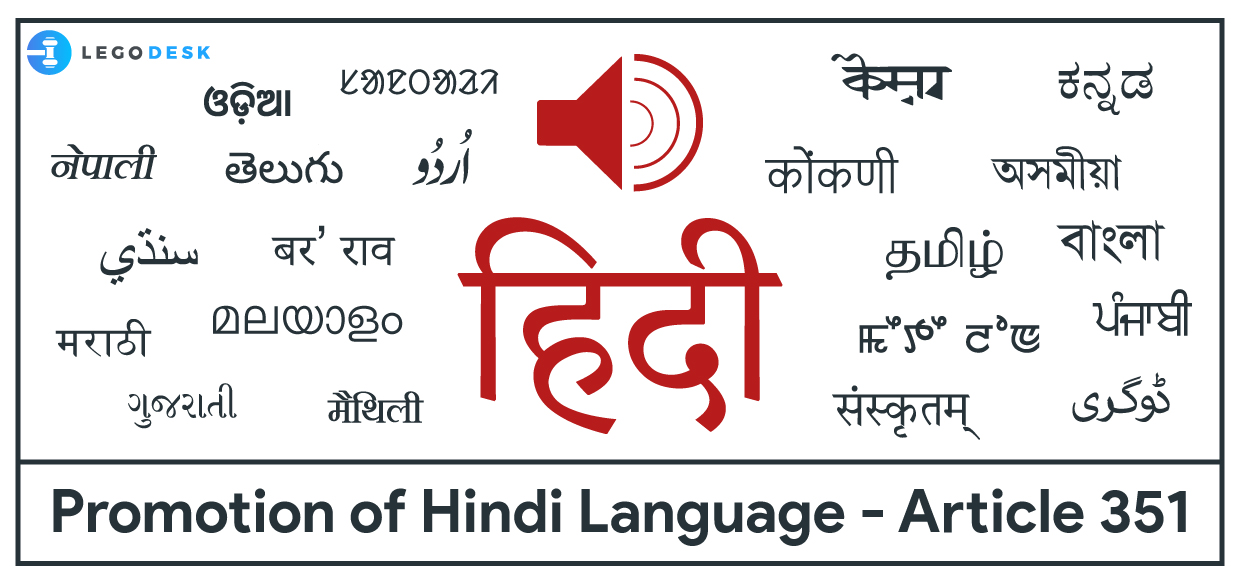Promotion of Hindi Language – Article 351

The article 351 which we are about to deal with has a very important relationship with the union or public at large. Also, the present article is related with lots of controversies, many legal fraternities and other renowned personalities who were of the opinion that the Article 351 is against the fundamental right and the ethos of the country where more than 15000 languages and dialects exist so promoting one language is not justified at all. Though Hindi is the mother tongue of the majority population in India and also the official language of India, Hindi cannot be considered as the mother tongue of every state in India. For example, In Maharastra for regional people, Marathi is their mother tongue, and they accept this very proudly. If we see other states in India like Tamilnadu, Karnataka, West Bengal, Andhra Pradesh, Kerala they have their regional languages which are the mother tongue of their citizens.
Therefore, as per the principle of Unity in Diversity, the promotion of a single language to all over the nation is not a good idea. Although if we see the number of percentages who speaks Hindi in the country, according to the census of 2001 is near about 52% of the Indian population and it also means that near about 48 percent of the total population in India do not speak Hindi. So, in the country where more than 40 % of the population is speaking other languages, then how can a single language be promoted.
Article 351 definition
For further discussion under this, first, we need to see what defined in Article 351 of the constitution of India. So, the present article is defined under Chapter IV (comprises of 3 articles, i.e., 350A, 350B and 351) of part XVII titled “Directive for development of the Hindi language.” It states that-
” It shall be the duty of the Union to promote the spread of the Hindi language, to develop it so that it may serve as a medium of expression for all the elements of the composite culture of India and to secure its enrichment by assimilating without interfering with its genius, the forms, style and expressions used in Hindustani and in the other languages of India specified in the Eighth Schedule, and by drawing, wherever necessary or desirable, for its vocabulary, primarily on Sanskrit and secondarily on other languages ”
So, in a nutshell, It would appear that all languages in the Eighth Schedule were completely intended to be promoted. It is also important to see the whole list (22 languages) mentioned int the 8th schedule which are,
(1) Assamese, (2) Bengali, (3) Gujarati, (4) Hindi, (5) Kannada, (6) Kashmiri, (7) Konkani, (8) Malayalam, (9) Manipuri, (10) Marathi, (11) Nepali, (12) Oriya, (13) Punjabi, (14) Sanskrit, (15) Sindhi, (16) Tamil, (17) Telugu, (18) Urdu (19) Bodo, (20) Santhali, (21) Maithili and (22) Dogri.
Of these languages mentioned above, 14 languages were included initially in the Indian Constitution. The Sindhi language was added in the year of 1967. After, three more languages viz., Konkani, Manipuri, and Nepali were added in the year 1992. Lastly, Bodo, Dogri, Maithili, and Santhali were included in the year 2004 as the official language of India. Along with that, 38 more languages were demanded to add in the 8th schedule.
The main objective of Article 351 is to the promotion of Language Hindi as link language between Indians which are crystal clear by the wording of lawmakers, but there is nothing specific about this in the definition of Article 351. And It is the duty on the Union part to promote the Hindi language which is subject to the acceptance by the other language representative necessarily, i.e., by all the language mentioned in Eighth Schedule. It is also to be taken into consideration that It can not blindly implement or spread all over the Nation in favor of the one language that is Hindi.
Many of the people in the legal fraternity has criticized Article 351 defined in the Indian Constitution for its biases towards other languages. Their reasoning is that the provision mentions under Article 351 was adopted when the States were organized in the form of Provinces (in British India time when some of the states were run by kings or Nawab’s under the British govt.) but at present Situation is different and we are a free country.

